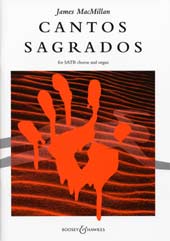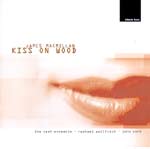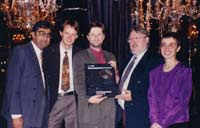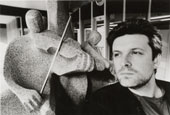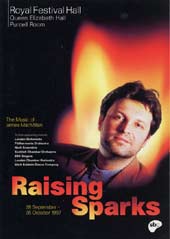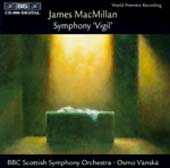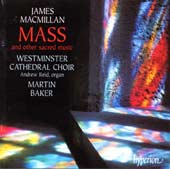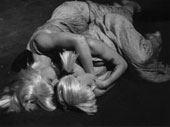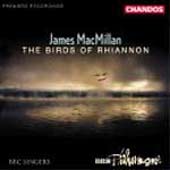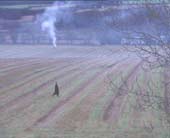James MacMillan Timeline
A year by year alignment of MacMillan's life and works
For works published by Boosey & Hawkes, links are provided to useful information including scorings, durations and repertoire notes.
Born 16 July at Kilwinning in Ayrshire, Scotland, son of a joiner and a teacher (later social worker)
The family moves to Cumnock where he attends the local Roman Catholic School
Tuition in piano and trumpet soon leads to earliest compositions, including a small piano piece and some orchestral music
Attends secondary school at Cumnock Academy where his musical activities embrace Renaissance church music. Meets future wife Lynne
Studies music at Edinburgh University where Rita McAllister introduces him to Stravinsky, Webern, Messiaen and 20th century Russian music
Begins postgraduate composition studies at Durham University with John Casken, and through ethnomusicology develops interest in gamelan
Returns to Ayrshire working as a part-time teacher. Starts playing and singing Scottish and Irish folk music. Local political and welfare activities during miners’ strike.
Beatus Vir for chorus and organ (withdrawn)
Sets The Tryst by William Soutar in the style of an old Scots ballad; the melody is to be a source of inspiration in many future works
Awarded doctorate from Durham University. His music is performed for the first time at the Musica Nova festival in Glasgow.
for wind quintet (1987, rev.1991)

Returns to Scotland and settles in Glasgow, heralding an extremely creative period. Catholicism and political concerns meet in Búsqueda, a turning point in the composer’s output. Collaborations with the Scottish Chamber Orchestra begin through educational projects.
for violin and piano
Composer-in-Residence at the St Magnus Festival, Orkney, where Tryst is premiered by the SCO under Paul Daniel. Teaches his first composers’ course on Hoy with Peter Maxwell Davies. Tryst selected for broadcast by International Rostrum of Composers.
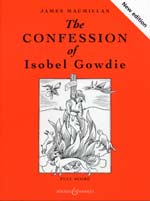
The Proms premiere of The Confession of Isobel Gowdie with the BBC Scottish Symphony Orchestra under Jerzy Maksymiuk is a momentous success, and its telecast boosts composer’s profile throughout UK. Búsqueda is performed at the Edinburgh Festival with Diana Rigg. Featured composer at Musica Nova in Glasgow where The Berserking is premiered by Peter Donohoe.
Concerto for piano and orchestra
Conducts The Confession of Isobel Gowdie with Philharmonia Orchestra in London and is subsequently appointed Visiting Composer. Tuireadh, written in response to the Piper Alpha oilrig disaster, is premiered at the St Magnus Festival by the Allegri Quartet and James Campbell. Featured composer at Huddersfield Contemporary Music Festival. Records the old Tryst song with his heroes of folk music, the Whistlebinkies. Attends performance of John Clifford’s play Inès de Castro and begins planning an opera.
for soprano and quintet or piano
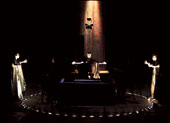
Tryst tours England on the Contemporary Music Network. First recordings of The Confession of Isobel Gowdie and Tryst released on Koch Schwann: the disc wins a Gramophone Award. Writes Veni, Veni, Emmanuel for percussionist Eveyln Glennie which is premiered to great acclaim at the BBC Proms. Launches the Philharmonia’s Music of Today series of early evening concerts in London, developing his interest in music beyond the central European mainstream, including Celtic, Nordic and Far Eastern composers, and those emerging from behind the former Iron Curtain.
Concerto for percussion and orchestra
Featured composer at the Edinburgh Festival with 18 works performed, including premiere of Epiclesis by trumpeter John Wallace, a double-bill of Búsqueda and Visitatio Sepulchri, and Sinfonietta and The Confession of Isobel Gowdie conducted by Leonard Slatkin. Attends staged performances of Búsqueda in Wiesbaden. Recording of Veni, Veni, Emmanuel, the first under a new contract with BMG, wins Classic CD Award and Koch Schwann disc of The Confession of Isobel Gowdie and Tryst wins Gramophone Contemporary Music Record of the Year Award.
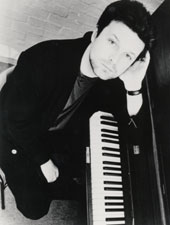
Travels to hear German premiere of Veni, Veni, Emmanuel with Sian Edwards conducting the Berlin Radio Symphony Orchestra, and first US performances with Mstislav Rostropovich conducting the National Symphony in Washington and the Cleveland Orchestra under Jahja Ling. On the strength of the work, Rostropovich asks MacMillan to write two scores: a cello concerto for him to play and a symphony to conduct. Seven Last Words from the Cross televised nightly through Holy Week on BBC TV, and premiered complete in Glasgow. The overture Britannia receives over 30 performances by UK orchestras in the 1994/95 season.
for voice and piano
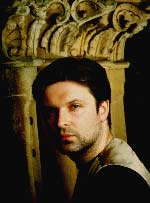
North American performances of Veni, Veni, Emmanuel with Evelyn Glennie during 1995/96 include New York Philharmonic (Slatkin), Boston (Ozawa), Milwaukee (Elder), Toronto (Saraste), Philadelphia (Andrew Davis), Detroit (Järvi), St Louis (Alsop), Los Angeles (Gershon), plus performances in Netherlands, France, Sweden, Denmark, Czechoslovakia, Japan and Australia. Conducts all-MacMillan concert in Gdansk including new version of Tuireadh with string orchestra.
for 16-part unaccompanied choir
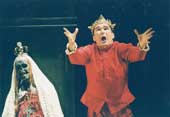
Premieres of The World’s Ransoming, the first of a triptych of commissions from the London Symphony Orchestra, and Inès de Castro by Scottish Opera at the Edinburgh Festival. The opera is a public success, but proves controversial for its blending of traditional narrative structure with postmodern musical style. Choreography of Confession of Isobel Gowdie by Mark Baldwin. Rostropovich is soloist in the Cello Concerto, with the LSO conducted by Sir Colin Davis.
for orchestra, with concertante cor anglais (1995-96)
Veni, Veni, Emmanuel reaches 100th performance in five years since its premiere. Celebrates anniversaries of St Ninian and St Columba with Ninian for clarinetist John Cushing, and Í (A Meditation on Iona). Fourteen Little Pictures premiered by György Pauk, Ralph Kirshbaum and Peter Frank. Featured composer at Bergen Festival. Premiere of Symphony ‘Vigil’, conducted by Rostropovich, completes the LSO’s Triduum series. 20 works performed at Raising Sparks festival in London, named after song cycle for Jean Rigby and Nash Ensemble.
Premieres of Why is this night different? by Maggini Quartet, and orchestral version of Cantos Sagrados.
for brass quintet and optional percussion

